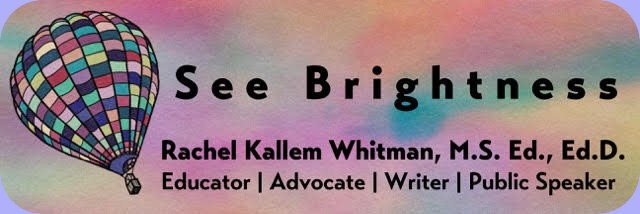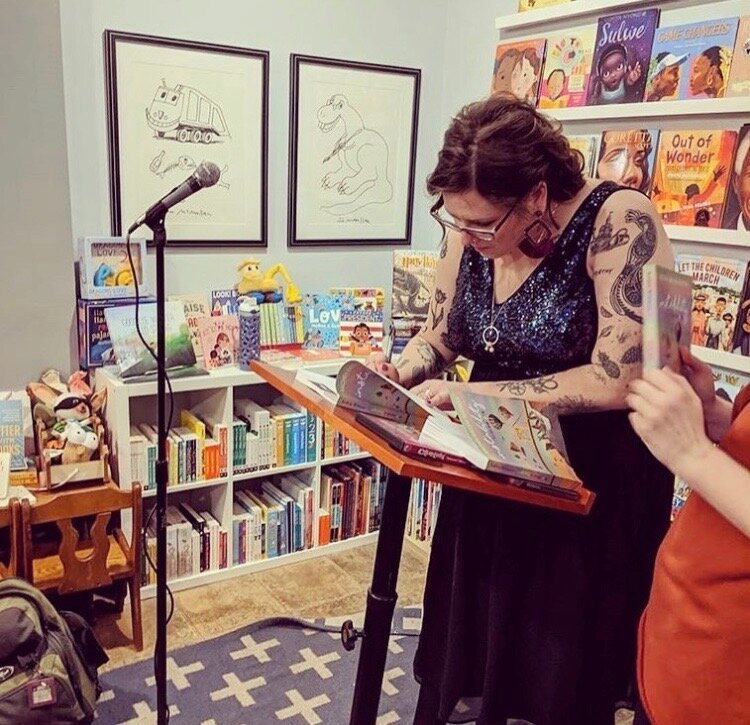Existential Quandary:
Who am I?
You’re still here! My name is Dr. Rachel Kallem Whitman and I’m a proud advocate in the disability and mental health community in the oh-so delightful city of Pittsburgh, also home to bridges, pirogies, and maybe sports. I’m more of a read-a-book-indoors kinda gal but I think we have a football team full of points…?
I exist in this work as someone with a mental illness and as an educator. A big component of my advocacy work is achieved through writing. I channel my passion into action by sharing my experience living life with a mental illness in a society where disability narratives are all too often dismissed and devalued. I fight stigma every time I type.
I’m also an adjunct professor at Duquesne University and I’ve been developing and teaching disability studies courses since 2017. My classes focus on examining disability through a social justice lens. My courses Psychology 101, Psychology of Social and Cultural Diversity, Perspectives on Disability and Illness, and Psychology and Social Engagement: Unpacking Ableism are anchored in the following principles:
Disability rights are human rights
Practicing responsible allyship
Access as a matter of social justice
Demystifying disability by detecting and challenging stereotypes, stigma, and prejudice
Celebrating disability as a source of pride, identity, community, and culture
Not only am I a self-advocate, educator, and content expert who has been consulted on various disability initiatives led by organizations serving the disabled community, but I'm also an experienced public speaker. I've presented at schools, colleges, foundations, and nonprofits about challenging ableism (discrimination in favor of nondisabled people) and sanism (discrimination in favor of neurotypical people); interpreting disability as a social justice issue anchored in ensuring access, normalizing interdependence, and recognizing the impact of intersectionality; and addressing the moral imperative of intentionally including diverse brains and bodies in everyday life. ln addition, I use these opportunities to engage audiences in conversations about celebrating disability as a source of pride, identity, community, and culture. My speeches, interviews, and writings have garnered acclaim locally in Pittsburgh (oh yeah, we also put fries on our salads!), across the United States, and internationally.
Why “See Brightness”?
When I was 17 years old, I was diagnosed with bipolar disorder and my world collapsed. After the diagnosis I struggled under the condemnation and low expectations set by stigma. I was told I wouldn’t be able to go to college, enjoy healthy relationships, or have a meaningful career. I remember the psychiatrists and therapists who dismissed and devalued me. I still try to forget the stays in psychiatric hospital wards. I can’t even count how many medications I tried over the years. During this challenging period in my life, it was hard to hold on to hope. Everything in my day-to-day existence was so painful that it made it impossible to envision a future. A life where my illness did not own me. But I’m a survivor. Instead of giving up I started to focus on the bright spots. To celebrate the small wins that brought a glimmer to my day. To appreciate the flicker of even the tiniest positive things in my life. To find the light in a life full of tangled moments. To remind myself that I always find my way out of the dark. Over the years I have come to accept that bipolar disorder will always threaten to topple my world, but I won’t let it extinguish who I am. I am a spark. A firework. A flame. I choose to see the brightness in my life.


